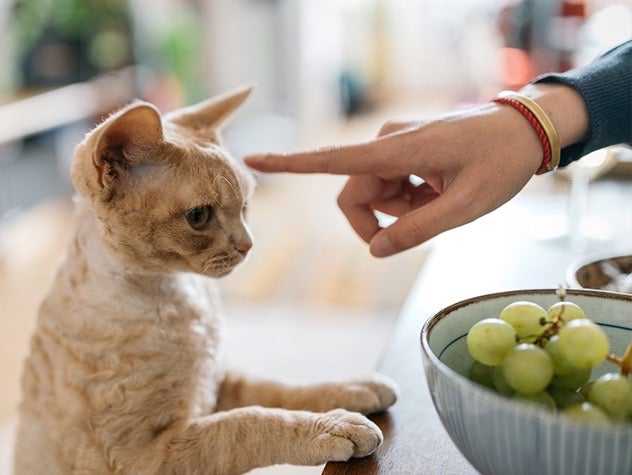Can Cats Eat Grapes?

Why Grapes are Dangerous for Pets
You have probably heard that grapes, raisins, and currents are dangerous for dogs to eat. It may sound odd, but veterinarians are not completely certain why grapes are highly toxic to dogs, and likely to cats as well.
Nestle Purina Veterinarian, Dr. Taylor Francis explains, “It’s a strange phenomenon. Some dogs don’t seem to be affected while in others, even one grape or raisin can cause damage to their kidneys depending on the size of the patient.”
Researchers suspect that salicylate (as in aspirin) or a mycotoxin produced by mold or fungus could be to blame. Even small amounts of seeded or seedless grapes, raisins, grape oil and currants can cause kidney failure in some dogs. It’s scary to think that something so sweet, simple, and enjoyable for us to eat can be so toxic to our pets!
Are grapes poisonous to cats?
Similar cases have also been reported in cats and ferrets. There have been a few anecdotal reports of kidney issues in cats exposed to raisin, but there are many more cases seen in dogs. Because the toxic dose is not known, and sensitivity has been shown to vary in individual animals, its recommended to avoid feeding any grape or raisin products to pets. The life of your best feline friend just isn’t worth the risk.
Why would my cat even eat grapes?
If you think about it, grapes are toy-sized and easy to bite! Grapes are often left out for human grazing in a tabletop bowl where pets can reach them. Grape stems have an interesting stick-like texture, too. While cats can’t taste the sweetness of grapes, they may chew and swallow unusual things out of boredom or curiosity. You might even have dropped a grape yourself, and then began tossing it around for your cat to bat at since you were no longer going to eat it yourself. It’s best not to tempt your curious cat, so keep grapes out of reach.
Because grapes and raisins are a frequent treat offered to children because they are sweet, healthy and easy to eat, be sure to let kids know that they shouldn’t share these with their dog or cat.
Are grapes and raisins safe for cats if they are cooked?
Grapes, raisins and currents are toxic even if cooked. Grape relish and roasted grapes are sometimes served with meat dishes, so think twice before offering your pet restaurant leftovers like picadillo, beef braciola or any dish with an unidentified fruit sauce. Grape products like grape jam and grape juice are also included in many different recipes that we enjoy and might not think to keep away from our pets.
Don’t animals instinctively know what foods might be dangerous for them?
We humans are notorious for playing “will my cat eat that?” with the foods we like to eat ourselves, because we assume food that is healthful for us at least wouldn’t be dangerous to them. However, as we learn more and more about pet health, it becomes very clear that we need to debunk the myth that animals always somehow instinctively “know” what’s good or bad for them.
However, just like humans, pets are curious creatures with individual tastes and may nibble on things to discover more about them. We all sometimes let our nose and taste buds lead us to experiment with things that aren’t necessarily healthy for us.
What are signs of kidney failure caused by grape toxicity in cats?
Early signs include vomiting, progressing to lethargy and lack of appetite and possibly diarrhea in around 12 to 24 hours. Signs of acute kidney damage include abdominal pain and excessive thirst and urination. If the kidneys shut down, the pet will stop producing any urine.
What should I do if I discover my cat has eaten grapes, raisins or currants?
Try to determine how many pieces of fruit your cat may have eaten and immediately call your veterinarian or an animal poison hotline for guidance.
- The Pet Poison Helpline number in North America is 800-213-6680.
- The ASPCA Animal Poison Control number is 888-426-4435
How will my veterinarian treat my cat if they suspect poisoning from eating grapes?
Your veterinarian may try to block absorption of the poison by causing your cat to vomit up the fruit and by administering activated charcoal by mouth. Your vet may continue with additional treatment to flush toxins from the body and support kidney function.
Dr. Francis added, “If acute kidney damage is confirmed, hospitalization, IV fluids, and multiple bloodwork checks may be required to monitor their kidney function.”
What can I give my cat as a treat instead of human food?
If you have a cat with adventurous tastes, make certain your cat’s daily diet is well-balanced and satisfies feline taste buds. Visit the Cat Food Selector on Purina.com for options that match your cat’s life stage and cravings.
Many cats do love extra-special treats. Packaged cat treats are the safest and most nutritious option for them. Hide a few in your cat’s favorite perching and sleeping spots to hunt and devour. You may want to grow some cat grass for your feline to graze on. If your cat has a special love for the cool texture of fruit, you can also try these homemade cooling treats on Petfinder.